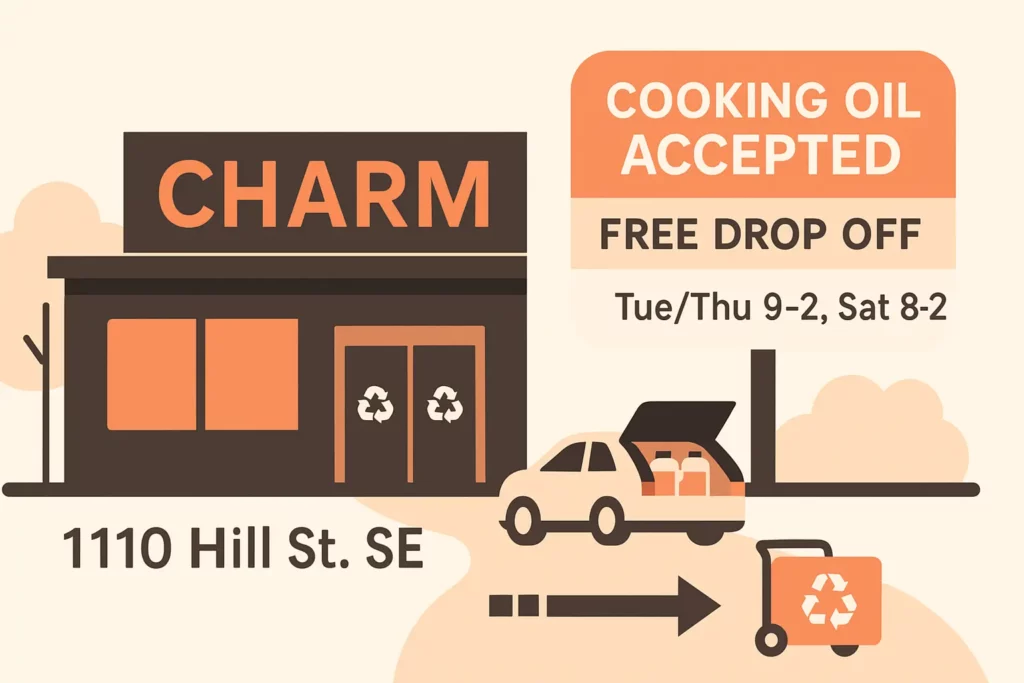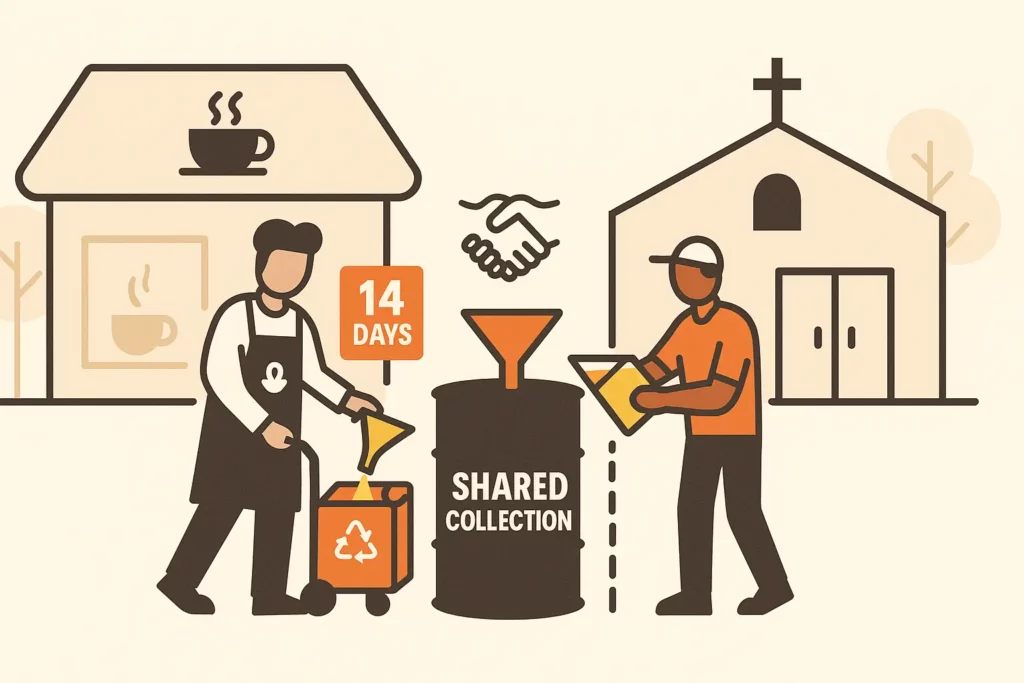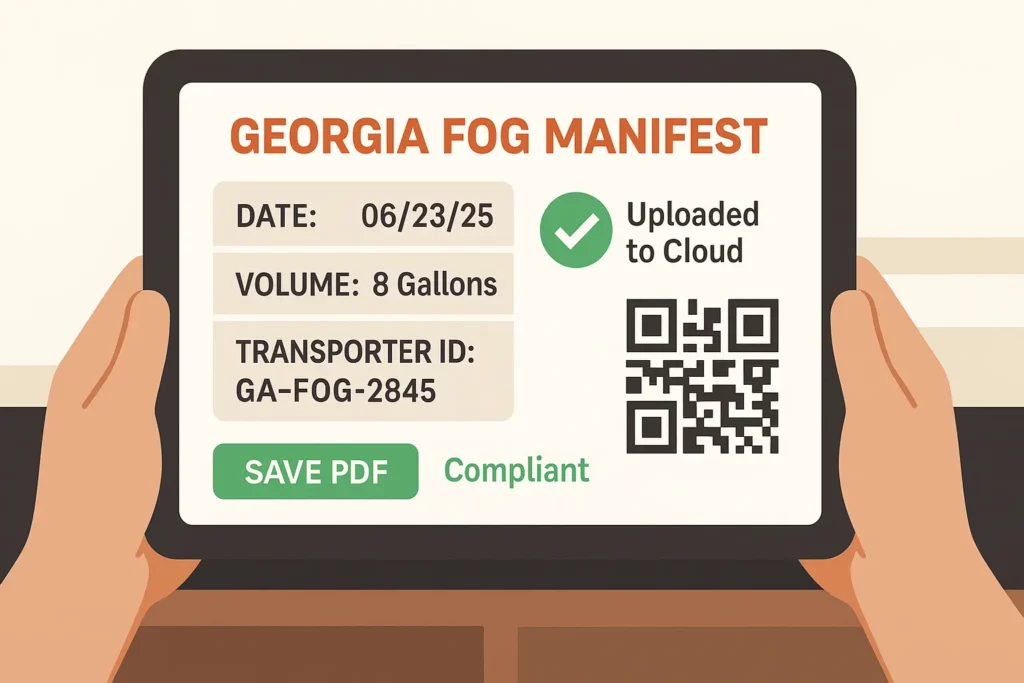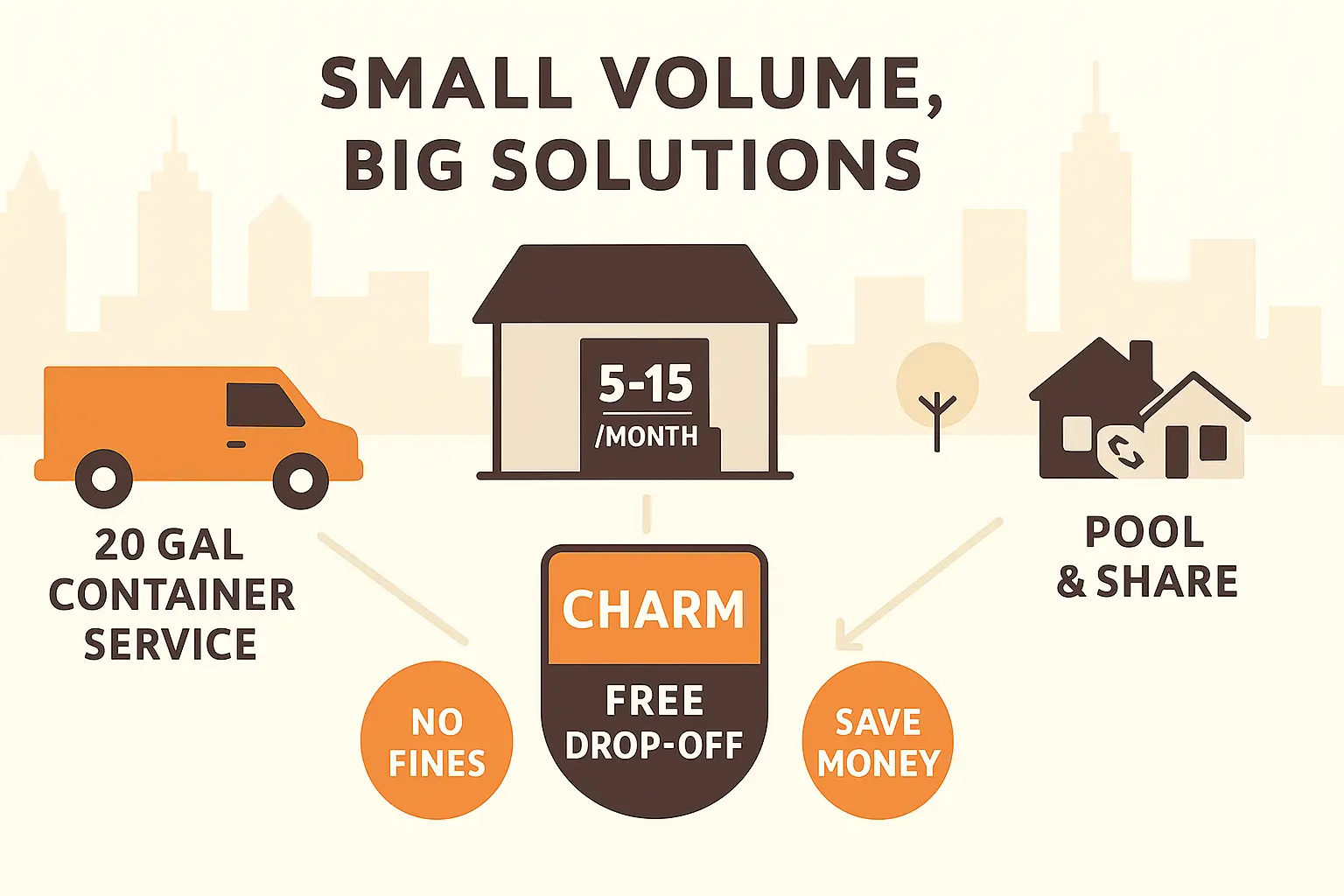Table of Contents
“I only have a few gallons a month what do I do?”
Fats, oils, and grease (FOG) poured down a sink quickly block city lines and trigger $1,000 plus penalties under Atlanta Watershed’s FOG program. Even a single overflow can contaminate streams and make the nightly news, so regulators treat cafés and church potlucks exactly like full service restaurants. The good news: low volume generators now have three Atlanta friendly options that keep costs low and paperwork light.
Option 1 “Right Sized” Container Pickups
Specialty collectors now offer 20 to 55 gallon lockable caddies that fit behind a single fryer and qualify for Georgia transporter registration (Rule 391 3 6 .24). Service fees are prorated by volume instead of the industry standard 250 gallon minimum, so kitchens earning under $30 a night from fryer sales still turn a modest rebate. Industry data compiled for Fulton County shows pickups starting at fifteen gallons with manifest uploads required within ten days. Grease Connections advises asking two questions before signing: ❶ “Is the truck’s state ID visible?” and ❷ “Do I keep digital copies of each manifest?” Both are audited during health inspections.
Table 1 Picking the Perfect Small Container (150 word narrative follows table)
| Capacity | Footprint | Best For | Typical Service Interval |
|---|---|---|---|
| 20 gal polypropylene “cube” | 18″×18″ | Food trucks, church halls | Every 6 to 8 weeks |
| 35 gal metal dolly | 24″×18″ | Cafés, donut shops | Monthly |
| 55 gal drum with lid | 24″×36″ | Community kitchens pooling oil | Quarterly |
Light, wheeled cubes slide under prep tables, while steel drums handle double batches after fish fry fund raisers. A tight sealing lid discourages grease theft and mosquitoes, the two hidden costs that sabotage DIY storage.

Option 2 Drop Off at CHaRM or County Events
Atlanta’s nonprofit CHaRM center accepts household and business cooking oil free of charge by appointment every Tuesday, Thursday (9 a.m. to 2 p.m.) and Saturday (8 a.m. to 2 p.m.) at 1110 Hill St. SE. Their “Fab 5” list confirms used cooking oil as an always free item for businesses under 30 gallons per visit. If Hill Street is a trek, Gwinnett’s quarterly Household Hazardous Waste Day and Cobb’s community recycling events also accept fryer oil. Rural kitchens can drive to Walton County’s Keep Walton Beautiful center or Columbus Water Works’ 24/7 grease stations.
Table 2 Metro Atlanta Drop Off Sites & Hours
| Site | Address | Hours | Volume Limit |
|---|---|---|---|
| CHaRM Atlanta | 1110 Hill St. SE | Tue/Thu 9 to 2, Sat 8 to 2 | 30 gal |
| CHaRM DeKalb | 1225 Columbia Dr. | Wed 9 to 2, Sat 8 to 2 | 30 gal |
| Gwinnett HHW Day | Fairgrounds (quarterly) | 8 a.m. to 12 p.m. | 20 gal |
| Keep Walton Beautiful | 2051 Willow Springs Rd. | Mon to Sat 7 to 4 | 25 gal |
| Columbus Grease Pods | Multiple | 24/7 | 10 gal |

Option 3 Pool Oil With a Neighboring Kitchen
If a café produces five gallons a week and the church next door hosts a monthly fish fry, combining volumes can unlock free pickups after the 50 gallon mark the break even threshold many collectors require. Coordinating manifests keeps each party compliant with Rule 391 3 6 .24 and Atlanta’s twin trap ordinance (§154 297.01). A written memo of understanding nothing more formal than a one page log proves chain of custody if inspectors ask. Grease Connections supplies a template during onboarding.

Compliance & Paperwork Why Small Volume Still Gets Big Fines
Atlanta prohibits enzyme or chemical “grease eaters” as shortcut substitutes for trap cleaning. Transporters must display a Georgia registration sticker and dump only at approved processors; missing paperwork incurs daily penalties that dwarf monthly pickup fees. Keep copies of manifests for three years (state rule) and thirty days in the truck (transporter rule) to sail through surprise audits.

Storytime: How One Midtown Café Cut Costs 40 %
A Midtown espresso bar generated just eight gallons a month too little for free pickup. By switching to a 20 gallon cube and booking quarterly service, they paid $15 per call, far less than the $300 emergency plumber they once hired after a drain clog. They joined a Saturday drop off run when holiday sales spiked, protecting cash flow and pipes. The owner’s “aha” moment? Realizing inspectors only care about manifests, not volume.
Fast Start Checklist
Within 48 hours you can be fully compliant: first, inventory your fryer volume; second, pick a container from Table 1; third, book a CHaRM slot or request a mini pickup; finally, save digital copies of every manifest in a cloud folder shared with your facilities team. Follow ups become automatic, and you’ll never scramble before inspection day again.
Ready to turn fryer waste into a compliance win? Schedule your right sized pickup or grab a CHaRM appointment today Grease Connections has every gallon covered.









